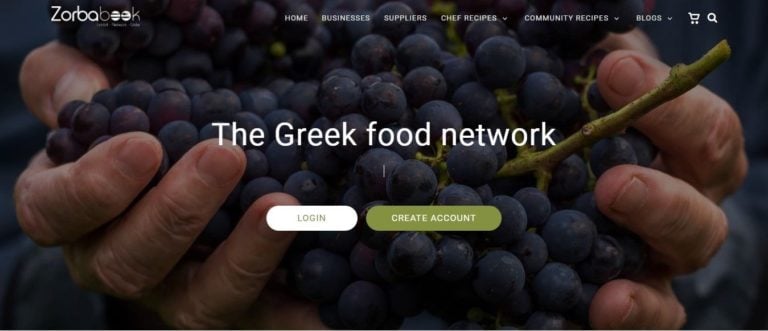Dimitris Palaiogiannis has an aim to educate people around the world that authentic Greek gastronomy goes well beyond the humble souvlaki, moussaka and horiatiki salata.
While this may seem fairly obvious for those familiar with the cuisine, for the 24-year-old, his motivations are about a much larger goal to help local producers, chefs and restaurants by connecting them with consumers around the world, and in turn boosting the country’s gastronomic tourism to improve the state of the economy, both regionally and nationally.
It makes sense, after all, throughout the financial crisis, the tourism sector has directly contributed 25 per cent GDP, and its no secret that gastronomy and tourism are interconnected.
How does he plan on pursuing this markedly huge ambition? Through Zorbabook, a B2B (Business to Business) and B2C (Business to Customer) platform that Dimitris has created and is set to launch mid-year.
Dimitris studied International Tourism Management in the UK, and returned to Greece where he worked as a tourism consultant for numerous Municipalities, mostly in the South Aegean Islands. These experiences further fuelled his passion for the country’s gastronomic offerings, which he says are unique given Greece’s vast history and microclimate.
“References on wine, olive oil, honey and wheat consumption are found in manuscripts but also in scientific research all over the islands and mainland. The plethora of unique products growing on Greek soil is due to the special microclimate,” he explains.
“We could dedicate a separate interview on these unique offerings. [But] I will only mention two: One is that our products constitute the Mediterranean diet, which is acknowledged as the healthiest, and the second is their variety all over Greece.”

READ MORE: South Aegean impresses as European Region of Gastronomy for 2019 [VIDEO]
This variety in both products and regional recipes, gives travelling a new dimension, offering people the chance to immerse themselves in the local way of life, learn about the history and customs of the different destinations they visit, which is where he hopes Zorbabook will be a conduit.
“Zorbabook is established to provide an online networking space, promotional tool and marketplace to Greek food and tourism stakeholders and users worldwide,” he explains.
By creating these connections, he believes it will facilitate co-operations.
And Dimitris has already witnessed the demand.
He put the feelers out in 2017, when he launched Zorbabook in a BETA version. The team created professional pages for 1,900 businesses and 1,000 producers, during which the platform had four million page views from 120 countries and 1,960 cities.
“These figures, as well as the interest in Greek recipes, confirmed we have to move forward by contacting brands to claim or create their professional pages,” Dimitris says.

Dimitris firmly believes that the diaspora is also a key stakeholder, with a vital role to play. Greek restaurants, retail shops, exporters, and distributors around the globe can be important ambassadors for Greek food promotion and further development.
“Australia is one of the most important markets for Greek products and cuisine due to the significant number of Greeks involved in the food industry,” explains Dimitris.
Which is why membership is open to anyone around the world, from producers and chefs, to businesses and passionate foodies, interested in finding out where they can enjoy the best Greek food and products both during their visits to Greece, and also while in their home countries, with access to special member benefits.
“My long-term goal is to create a focused ecosystem, which will support our member brands in networking, cooperating and promoting their businesses, [and] to continuously grow our network with top industry professionals in order to become a stakeholder who can contribute in supporting and assisting further development of Greek food tourism as well as local/regional communities,” he says.
Dimitris is just one of many young, entrepreneurial people in Greece who show optimism and promise for the country’s future. He says it is his love for Greece and passion to contribute further to its success that he decided not only to study but to invest.
READ MORE: Food, agrotourism, and Greece: perfect together
But he acknowledges he can only do so much on his own.
“We should bare in mind that in order for tourism to continue achieving positive economic, social and environmental impact, optimum support from the state and interlinked sectors is a must,” he explains.
“For example, niche tourism forms like hiking tourism cannot be developed if routes infrastructure do not comply with international standards. Food and tourism industries impact directly each other and therefore both have to be part of a common strategic development plan. For instance, if we want to provide travellers with authentic and quality food and product experience, agriculture sector needs to keep up with the continuously increasing tourist flows.”
Dimitris says the sooner stakeholders realise this and take action, the quicker Greece will secure a competitive advantage and better future for the country and its people.
“We need to take advantage of our successes, analyse and understand challenges and solve problems through synergies and co-operations.”
To find out more about Zorbabook and to sign up, visit https://www.zorbabook.com